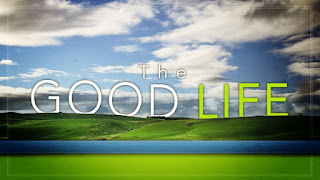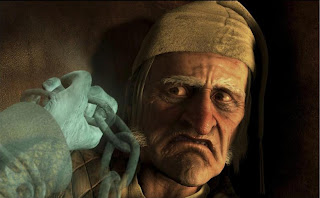The Good Life Part 2
It is a corporate truism that strategy is as much about choosing what not to do, as it is about choosing what to do. Why? Because there will always be less resources than are possible plans, and because some plans simply contradict or cannibalise others. Synergistic adjacencies do exist, but a company that tries to be everything to everyone is increasingly unlikely to succeed as it spreads itself ever thinner, until it breaks.
So, takeaway no. 1 - pursuing excellence in what we do is an important responsibility that we take on as stewards of our lives. But pursuing success and self-empowerment just so that we can have the "freedom" to make more choices about what we do isn't the answer to The Good Life. It turns out this so-called "freedom" makes us worry even more about whether we've made a mistake!
For this reason, we continually have to choose what not to do. This can actually be quite a liberating experience, if we do it right. The psychologist Barry Schwartz noted in his book "The Paradox of Choice - Why More is Less", that although autonomy and freedom of choice are critical to well-being, the proliferation of choice in much of modern society does not seem to have resulted in increased happiness.
Schwartz posits a few reasons for this (some of which I admit are beyond me!). But here are some points that make sense to me. First, increased individual choice is often a consequence of increased affluence. What was once given by family, neighbourhood and workplace is now obtained by the individual. There's something about being given something that's more fulfilling to the soul, as opposed to getting it yourself (even if the thing we're getting for yourself is "objectively" a nicer thing). This makes sense - being a recipient of a gift provokes gratefulness. Grateful people who are part of a giving relationship are, unsurprisingly, happier.
Second, increased individual choice means increased decision points. This elevates stress because of buyer's remorse. The more choices we have, the more we think about the decisions we chose not to make. If we have five equally attractive jobs to take up, we'll keep thinking about the four we didn't eventually choose. If we only had one great job opportunity, we'd gratefully take it up. This is true even of mundane life choices - having to make a choice of breakfast cereal out of an aisle full of 37 different brands is a much more stressful experience than picking which of the two cereals our mum bought we should eat.
So, takeaway no. 1 - pursuing excellence in what we do is an important responsibility that we take on as stewards of our lives. But pursuing success and self-empowerment just so that we can have the "freedom" to make more choices about what we do isn't the answer to The Good Life. It turns out this so-called "freedom" makes us worry even more about whether we've made a mistake!
On the contrary, living an uncluttered life in a relationship with people and with God, and leaning on that community, makes us grateful. In Matthew 6, Jesus explains "... Do not worry about your life, what you will eat or drink; or about your body, what you will wear. Is not life more than food, and the body more than clothes? Look at the birds of the air; they do not sow or reap or store away in barns, and yet your heavenly Father feeds them. Are you not much more valuable than they? Can any one of you by worrying add a single hour to your life?... So do not worry, saying, 'What shall we eat?' or 'What shall we drink' or 'What shall we wear?'"
But even after we boil out the extraneous clutter of choices that life throws at us, we still have choices to make. Fewer choices, but they're the ones that matter.
For three years, I lived on campus in a hall of residence. I had a packed and meaningful hall life, from student leadership to sports to arts, and friends from every faculty. But when my wife-to-be appeared in my life, I had a choice. Keep doing what I was doing in the hall, or spend time with her. I chose her. Hall life was great. Really great. I learned so much and enjoyed it tremendously. But there was a choice to be made, and I haven't regretted it a moment.
For a couple of years, I remember thinking to myself that I was doing really really well at work. I was young, I had an important title, an exciting mandate that covered countries all over the region, a big team, great pay and a supportive boss. But when I realised I was becoming someone I didn't like - impatient, seldom available to family, unable to lead my church cell group - I had a choice. Keep progressing in the workplace, or do something else. So I left. Again, this career experience was great, because I learned so much and enjoyed it tremendously. But there was a choice to be made, and I haven't regretted it at all.
Former Pepsico CEO Indra Nooyi once honestly admitted, with regards to the issue of work-life balance: "I don't think [you] can have it all. I just don't think so. We pretend we have it all. We pretend we can have it all... Being CEO for a company is three full time jobs [wife, mother, CEO] rolled into one. How can you do justice to all? You can't."
Oprah Winfrey echoed this, saying "You can have it all. You just can't have it all at once."
So, takeaway no. 2 - to enjoy The Good Life, sometimes we have to choose to let something go, so we can do the really important thing. As Christians, the decision to "let something go" can be even more stark - because nothing should be an idol in substitution for God. Not career, not reputation, not money, not influence, not even family.
In Matthew 6:24 Jesus teaches "No one can serve two masters. Either you will hate the one and love the other, or you will be devoted to the one and despise the other. You cannot serve both God and money."
The Christian writer Corrie Ten Boom, whose family gave up their lives to help Jewish refugees during the Holocaust, wrote: "Hold everything in your hands lightly, otherwise it hurts when God pries your fingers open".
This might seem a little upsetting, but giving up something good in favour of something even better should really be a no-brainer. As I wrote above - my hall life was amazing, but giving it up for my wife was one of the best trades of my life. Giving up a big work title to be "husband", "father", "friend" and "cell leader" was a fantastic trade too.
But even all those things pale in comparison to being "child of God" - the ultimate Best Trade Ever.
[SPOILER ALERT] The TV series "The Good Place" irreverently parodies a situation where a bunch of people wrangle with a bumbling God and a petty Devil through a series of zany adventures to get themselves from the "Bad Place" to the "Good Place". In the series finale, all has gone well, and the protagonists all get to the "Good Place" where they finally have all the good things they ever wanted - friendship, family, food, fun, and FOREVER. But - a twist. Each protagonist eventually realises - is that all? And one by one, they decide, I've had enough, and they walk off into oblivion, fade to black, end of series.
The author Francis Chan asks this - if you were told you could have heaven, with all the friends, family, food and fun that you could ever desire, but no God, how many of us would, hand on heart, quietly admit, yeah I'll take that.
But as the series finale to "The Good Place" astutely observes - "heaven", with all those good things, but no God, is no heaven at all.
A very different finale is depicted by C.S. Lewis in the very last page of the last volume of his Chronicles of Narnia, as the camera zooms out on the children, still talking to Aslan (Lewis' representation of Jesus).
"And for us (the reader) this is the end of all the stories, and we can most truly say that they all lived happily ever after. But for them it was only the beginning of the real story. All their life in this world and all their adventures in Narnia had only been the cover and the title page; now at last they were beginning Chapter One of the Great Story, which no one on earth has read; which goes on for ever; in which every chapter is better than the one before"
Perhaps it's hard for me to explain to someone without actually talking through the entire anthology of stories and the many many trials and tribulation and adventures. But this is the most satisfying ending I have ever read in any storybook - and the wonder of it all is that I've started on the road that leads that way and one day, I'll see it with my own eyes!
Thank You Lord for The Good Life - to know you and all the good plans you have in store. There's really nothing like it, and no one like You :)
Now this is eternal life: that they know you, the only true God, and Jesus Christ, whom you have sent.
John 17:3















Comments